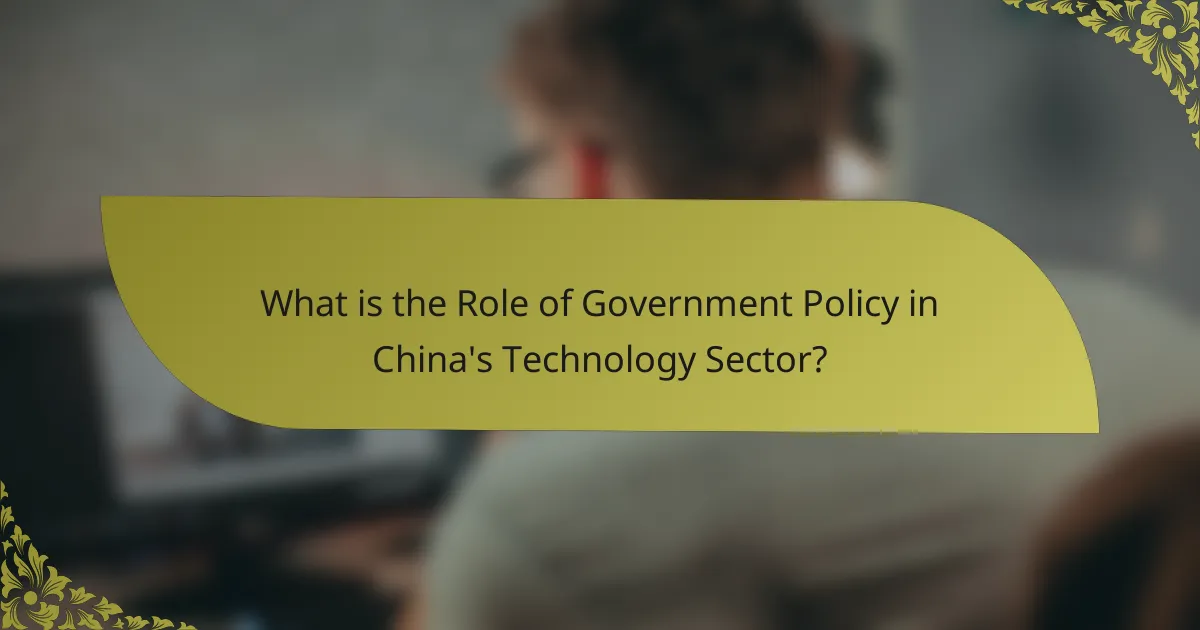Government policy is a fundamental entity influencing the technology sector in China. This article examines how regulations, funding, and strategic initiatives shape the industry, highlighting the government’s commitment to technological innovation as a national priority. Key policies, such as “Made in China 2025,” focus on enhancing domestic capabilities in high-tech industries, while significant financial support is provided to startups and research institutions through grants, tax incentives, and favorable loan conditions. Additionally, regulations ensure compliance with national security and data protection standards, collectively driving growth and competitiveness in the technology sector.

What is the Role of Government Policy in China’s Technology Sector?
Government policy plays a crucial role in China’s technology sector. It shapes the industry through regulations, funding, and strategic initiatives. The Chinese government actively promotes technological innovation as a national priority. Policies such as “Made in China 2025” aim to enhance domestic capabilities in high-tech industries. Additionally, the government provides significant financial support to startups and research institutions. This includes grants, tax incentives, and favorable loan conditions. Regulations also ensure compliance with national security and data protection standards. These policies collectively drive growth and competitiveness in the technology sector.
How do government policies shape the technology landscape in China?
Government policies significantly shape the technology landscape in China. The Chinese government implements regulations that promote domestic innovation. These policies often include funding for research and development. They also establish guidelines for data security and privacy. Additionally, the government enforces restrictions on foreign technology companies. This creates a competitive environment for local firms. For example, the “Made in China 2025” initiative aims to make China a leader in high-tech industries. Such policies drive investment in sectors like artificial intelligence and telecommunications. Overall, government actions directly influence technology growth and market dynamics in China.
What are the key government policies influencing the technology sector?
Key government policies influencing the technology sector in China include the Made in China 2025 initiative, which aims to enhance domestic manufacturing capabilities. This policy focuses on high-tech industries, including robotics and aerospace. Another significant policy is the Internet Plus strategy, promoting Internet integration with traditional industries. The Cybersecurity Law enforces strict data protection and cybersecurity measures for technology companies. Additionally, government funding and subsidies support research and development in emerging technologies. These policies collectively shape market dynamics and drive innovation within the sector.
How do these policies impact innovation and development?
Government policies significantly influence innovation and development in China’s technology sector. Regulations can either promote or hinder technological advancements. For instance, supportive policies such as tax incentives encourage investment in research and development. A 2021 report by the Chinese Ministry of Science and Technology indicated that such incentives led to a 15% increase in R&D spending among tech firms. Conversely, stringent regulations may restrict market entry for startups, limiting innovation. A study published in the Journal of Technology Transfer found that overly restrictive policies resulted in a 20% decline in new tech company formations. Overall, the balance of regulations and incentives shapes the landscape for innovation and development in China’s technology sector.
What are the main types of regulations affecting China’s technology sector?
The main types of regulations affecting China’s technology sector include data privacy laws, cybersecurity regulations, and anti-monopoly laws. Data privacy laws, such as the Personal Information Protection Law, govern how companies collect and manage user data. Cybersecurity regulations mandate that technology firms enhance their security measures to protect national interests. Anti-monopoly laws aim to prevent monopolistic practices and promote fair competition among tech companies. Additionally, export controls restrict the transfer of sensitive technologies to other countries. These regulations are part of the government’s broader strategy to control the technology landscape and ensure national security.
What specific regulations govern data privacy and cybersecurity?
The specific regulations that govern data privacy and cybersecurity include the Personal Information Protection Law (PIPL) and the Cybersecurity Law of China. The PIPL, enacted in 2021, establishes comprehensive rules for the collection, storage, and processing of personal data. It emphasizes user consent and data subject rights. The Cybersecurity Law, implemented in 2017, mandates security measures for network operators and data protection requirements. These regulations aim to safeguard personal information and enhance cybersecurity across various sectors. Compliance is enforced through penalties for violations, ensuring that organizations adhere to standards set by the government.
How do export controls affect technology companies in China?
Export controls significantly impact technology companies in China by restricting their access to critical components and technologies. These controls limit the export of advanced semiconductors and software essential for innovation. As a result, Chinese tech firms face challenges in maintaining competitiveness in global markets. For instance, companies like Huawei have experienced substantial setbacks due to restrictions on accessing U.S. technology. The inability to procure advanced chips hampers their product development and market expansion. Furthermore, export controls can lead to increased operational costs as companies seek alternative sources. Overall, these measures create a challenging environment for technology firms in China, affecting their growth and innovation capabilities.
What incentives are provided by the government to promote technology growth?
The government provides several incentives to promote technology growth. These include tax breaks for tech companies. Research and development grants are also offered to stimulate innovation. Additionally, the government invests in technology infrastructure. Funding for startups is available through various programs. Policies favoring foreign investment enhance technology transfer. Lastly, educational initiatives support workforce development in tech fields. These measures collectively aim to foster a robust technology ecosystem.
How do tax incentives influence investment in technology startups?
Tax incentives significantly boost investment in technology startups. These incentives reduce the overall tax burden on investors and startups. Lower taxes increase the potential return on investment. Consequently, investors are more likely to fund technology startups. For example, in China, policies like the High-tech Enterprise certification offer substantial tax reductions. This has led to increased venture capital flow into the technology sector. A report by the China Venture Capital Research Institute states that tax incentives have driven a 30% increase in tech startup funding. Therefore, tax incentives create a favorable investment climate for technology startups.
What role do grants and subsidies play in fostering technological innovation?
Grants and subsidies significantly enhance technological innovation by providing essential funding for research and development. They reduce financial risks for startups and established companies. This financial support allows businesses to explore new technologies without the immediate pressure of profitability. For example, China’s government allocated over $30 billion in subsidies to support its tech sector in 2020. Such investments have led to advancements in artificial intelligence and renewable energy technologies. Moreover, grants often target specific industries, encouraging innovation in areas deemed critical for national development. This targeted approach aligns private sector efforts with public policy goals. Overall, grants and subsidies act as catalysts for technological progress by enabling experimentation and reducing barriers to entry.
How do market dynamics interact with government policies in China’s technology sector?
Market dynamics in China’s technology sector are significantly influenced by government policies. The Chinese government implements regulations that shape market competition. For example, policies can promote or restrict foreign investment. These regulations affect how domestic companies operate and compete. Additionally, government incentives encourage innovation and research in technology. Subsidies and tax breaks are examples of such incentives. Market dynamics also respond to government initiatives aimed at fostering specific industries. For instance, the Made in China 2025 policy targets high-tech manufacturing. This creates opportunities for growth in certain sectors. Overall, the interaction between market dynamics and government policies creates a unique ecosystem in China’s technology landscape.
What is the relationship between government policy and market competition?
Government policy directly influences market competition by establishing rules and regulations. These policies can promote fair competition or create barriers to entry. For instance, antitrust laws prevent monopolistic practices. Regulations can also dictate market standards, affecting how companies operate. In China, government policies shape the technology sector significantly. The government provides incentives for innovation and investment. This creates a competitive environment among tech firms. Studies show that supportive policies can enhance market dynamics and drive economic growth. Thus, the relationship between government policy and market competition is integral to sector development.
How do government policies influence consumer behavior in the tech market?
Government policies significantly influence consumer behavior in the tech market by shaping market dynamics and consumer choices. Regulations can restrict or promote certain technologies, impacting availability. For example, China’s regulations on data privacy affect consumer trust in tech companies. Incentives like subsidies for electric vehicles encourage consumers to purchase greener technologies. Policies that promote innovation can lead to increased competition, resulting in lower prices for consumers. Additionally, government initiatives can foster the development of local tech firms, influencing consumer preferences towards domestic products. Historical data shows that policy shifts can lead to rapid changes in consumer behavior, as seen during the rollout of 5G technology in China.
What challenges do technology companies face due to government policies?
Technology companies face several challenges due to government policies. Regulatory compliance can be burdensome and costly. Companies must adhere to strict data protection and privacy laws. These regulations can limit innovation and slow down product development. Additionally, trade restrictions can hinder access to international markets. Companies may also face scrutiny over anti-competitive practices. Changes in policy can create uncertainty, impacting investment decisions. Furthermore, government intervention can lead to favoritism towards state-owned enterprises. This can disadvantage private technology firms in competitive markets.
How can compliance with regulations impact business operations?
Compliance with regulations can significantly impact business operations by influencing costs, processes, and market access. Adhering to regulations often requires businesses to invest in compliance systems and training. This can increase operational costs and affect profit margins. Regulations can also dictate how products are developed, marketed, and sold. For example, in the technology sector, data protection laws can require companies to implement strict data handling protocols. Failure to comply can result in penalties, legal action, or loss of business licenses. Moreover, compliance can enhance a company’s reputation and build customer trust. In China’s technology sector, regulatory compliance is essential for market entry and sustainability.
What are the risks of government intervention in the technology sector?
Government intervention in the technology sector can lead to several risks. One major risk is stifling innovation. When governments impose heavy regulations, it may discourage companies from investing in new technologies. This can result in slower technological advancement. Another risk is market distortion. Government policies can create an uneven playing field, favoring certain companies over others. This may lead to monopolies or oligopolies. Additionally, intervention can cause inefficiencies. Bureaucratic processes might slow down decision-making in tech companies. This can hinder their ability to respond to market changes swiftly. Furthermore, government control can lead to a lack of transparency. Companies may face uncertainty regarding future regulations, impacting their strategic planning. Lastly, there is a risk of misallocation of resources. Government funding might not align with market needs, resulting in wasted investments. These risks highlight the complexities of government involvement in the technology sector.
What future trends can we expect in government policy and the technology sector?
Future trends in government policy and the technology sector will focus on increased regulation and support for innovation. Governments are likely to implement stricter data privacy laws. This aligns with global concerns about consumer protection. Additionally, there will be more incentives for green technology initiatives. Governments are recognizing the importance of sustainability in tech development. Public-private partnerships may become more common to foster innovation. This approach can enhance resource sharing and collaborative projects. Moreover, national security concerns will shape technology policies. Governments may prioritize domestic tech production to reduce dependency on foreign entities. These trends reflect a shift towards a more regulated and supportive environment for technology growth.
How might evolving regulations shape the future of technology in China?
Evolving regulations will significantly shape the future of technology in China. These regulations can create a framework that encourages innovation while ensuring compliance with national standards. For instance, recent data privacy laws, such as the Personal Information Protection Law (PIPL), have set strict guidelines for data handling. This fosters consumer trust and enhances the market for tech firms that prioritize data protection. Furthermore, regulations around artificial intelligence and cybersecurity will direct investment towards compliant technologies. The Chinese government has also introduced incentives for companies that align with its strategic goals, such as green technology. This trend is evident in the push for sustainable practices in tech development. Overall, evolving regulations will guide investment, innovation, and market dynamics in China’s technology sector.
What innovations are likely to emerge as a result of government incentives?
Government incentives are likely to spur innovations in renewable energy, artificial intelligence, and biotechnology. These sectors are already receiving substantial funding and support from the Chinese government. For instance, the “Made in China 2025” initiative aims to advance high-tech industries. This initiative allocates resources to develop smart manufacturing and green technologies. Furthermore, government grants and tax incentives encourage startups to invest in research and development. Historical data shows that such policies have led to rapid advancements in technology. In 2020, China became the world’s largest investor in renewable energy, showcasing the effectiveness of these incentives.
What best practices should technology companies adopt in response to government policies?
Technology companies should adopt compliance, transparency, collaboration, and adaptability as best practices in response to government policies. Compliance ensures adherence to regulations, minimizing legal risks. Transparency builds trust with stakeholders, including customers and regulators. Collaboration with government bodies can lead to better alignment on policy objectives. Adaptability allows companies to pivot strategies in response to changing regulations. These practices are essential for navigating the complex regulatory landscape in China’s technology sector. For instance, companies like Alibaba have engaged in dialogue with regulators to align their business practices with government expectations. This proactive approach helps firms remain competitive while adhering to legal frameworks.
The main entity of the article is the role of government policy in China’s technology sector. The article examines how government regulations, incentives, and strategic initiatives shape the technology landscape, focusing on key policies such as “Made in China 2025” and the Internet Plus strategy. It discusses the impact of these policies on innovation, market dynamics, and consumer behavior, while also highlighting the challenges technology companies face due to regulatory compliance and government intervention. Additionally, the article outlines future trends in government policy and their potential influence on technological advancements in China.



